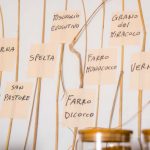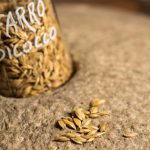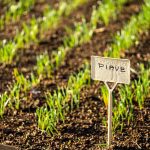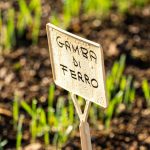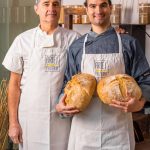A Bread Garden
The organic roots of the Dal Piccol family

From Marina Grasso
The neat rows of grain growing inevitably arouse curiosity. But more curious still is the sign L’Orto del Pane – The Bread Garden – which describes the small crops of ancient cereals grown by Franco Dal Piccol and his son Andro. Of course they know that you don’t grow bread: they craft it themselves in their artisan bakery, Aries Pasteria, where they’ve been baking bread, biscuits, pizzas and pastries since 1985, using only certified organic raw materials and mother dough.
The unusually named Bread Garden is the culmination of a story that started more than forty years ago, in the heart of Vidor, surrounded by the vineyards and wineries of Conegliano Valdobbiadene DOCG. That’s when Franco Dal Piccol began to combine his passion for the art of baking with his commitment to organic farming and food, before public awareness of the connections between the health of the planet and how we grow our food started to become mainstream.
“In the 1970s I was a young lathe operator but increasingly I felt the need for a more natural diet and the desire to sensitise local farmers to the concept of organic farming. I learnt more by attending courses and seeking out local places that shared my concerns. Back then, this meant just a handful of shops dedicated to macrobiotics. Then I founded a cultural association that eventually evolved into the first organic shop in my area: we’d meet up in my living room and exchange the products I’d brought back in my rucksack from the weekend seminars I attended in regions around Italy, especially in Bologna”.
Franco’s passion and the sensitivity of the people in Vidor and its surrounding areas sparked a growing movement of increasingly conscientious and discerning consumers, which in turn prompted Franco to open his own organic bakery. “I went to a long-established Veneto bakery to learn their recipes and techniques, and during the summer months I’d continue my training by working in France and Germany. They were wonderful pioneering years – not only because I could indulge my thirst for knowledge, eat organically and develop my passion into a thriving profession, for a long time combining my job as a lathe operator with my research into the world of organic food, but also because I witnessed people’s growing awareness of the need for a diet that respected both the individual and the planet. Still today, they choose my baked goods because they know their characteristics and appreciate our philosophy”.
Over the years, Franco’s commitment has gradually developed the bakery Aries Pasteria into a thriving business, spanning over 1200 square metres of floor space divided between bakery and storage areas. Despite its growth, the business has remained true to its artisanal roots, one whose dedication to careful raw materials selection and sustainable processes has never wavered. The organic roots of the Dal Piccol family: from an intuition born in the 1970s to a great artisanal bakery, where plots of ancient grains tell great stories of biodiversity and authenticity This commitment is evidenced not only in the superior quality of their organic ingredients, but also the solar panels and heat recovery system installed on the flues of the ovens, which in turn is used to heat the premises and pro – vide hot water.
The Bread Garden at the entrance to the company’s shop serves to highlight the same message – Franco explains: “We decided to set it up because local schools often asked if they could visit our bakery, and it seemed like great a way to explain the process to kids, from growing the cere – als to making the flour and dough. It’s also because my son and I have spent many years researching heirloom cereals, which, while not very ancient perhaps, have been supplanted by more profitable hybrids. Thanks to the inspiration of the food and diet historian Danilo Gasparini and the guidance of Riccardo Gasparini, the project now involves agronomists, farming institutes and universities in recovering increasingly significant grain varieties, which we sow twice a year, turning these occasions into opportunities for celebration. The cereals have names that are almost completely unknown, such as Piave, Verna, San Pastore, Gentil Rosso, Grano del Miracolo among others. Together with better-known varieties like Senatore Cappelli and Farro Monococco they create a spectacularly colourful and varied vegetable plot. We only grow a few plants, never enough to actually bake with. But through them we can continue to highlight the importance and beauty of biodiversity, organic farming, respect for the individual, and the environment”.
Photo credits: Francisco Marques
[Article originally published in Visit Conegliano Valdobbiadene magazine Spring Summer 2023. The entire magazine is available here]
